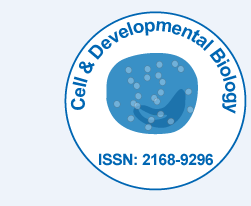
Cell & Developmental Biology
Open Access
ISSN: 2168-9296

ISSN: 2168-9296
Commentary Article - (2024)Volume 13, Issue 3
Hematopoietic Stem Cells (HSCs) are the precursors of the blood and immune systems, responsible for replenishing all blood cell types throughout an individual's lifetime. Understanding the characterization and regulation of HSCs is fundamental to unraveling the mechanisms governing blood cell formation, which has significant implications for both basic research and clinical applications. In this article, we explore the key aspects of HSC biology, including their characterization, regulation, and role in blood cell formation.
Characterization of Hematopoietic Stem Cells (HSCs)
HSCs are multipotent cells residing primarily in the bone marrow, but they can also be found in other tissues such as the umbilical cord blood and peripheral blood. One defining characteristic of HSCs is their capacity for self-renewal, enabling them to maintain a group of stem cells throughout life while also giving rise to a diverse range of blood cell lineages. HSCs are characterized by the expression of specific cell surface markers, such as CD34 and CD133, as well as functional assays that demonstrate their ability to differentiate into multiple blood cell types.
Regulation of hematopoietic stem cells
The balance between HSC self-renewal and differentiation is tightly regulated by a complex network of intrinsic and extrinsic factors. Intrinsic regulators include transcription factors, epigenetic modifiers, and signaling pathways that govern HSC fate decisions and lineage commitment. Extrinsic regulators, on the other hand, encompass the bone marrow microenvironment, or niche, which provides crucial signals to support HSC maintenance and function. These signals include cytokines, growth factors, and cell-cell interactions that modulate HSC behavior in response to physiological cues and environmental stressors.
Role of hematopoietic stem cells in blood cell formation
HSCs promotes all blood cell lineages through a process known as hematopoiesis, which involves the sequential differentiation of progenitor cells into mature blood cells. This process is tightly regulated to ensure the proper balance and functionality of different blood cell types, including red blood cells, white blood cells, and platelets. HSCs can undergo asymmetric division to generate both self-renewing daughter cells and committed progenitors, which subsequently differentiate into specialized blood cell types under the influence of lineage-specific transcription factors and environmental cues.
Clinical implications
Understanding the regulation of HSCs has significant clinical implications for regenerative medicine, Hematopoietic Stem Cell Transplantation (HSCT), and the treatment of hematological disorders. HSCT, in particular, relies on the ability of HSCs to reconstitute the blood and immune systems following transplantation, provides a potentially irreversible therapy for a variety of diseases, including leukemia, lymphoma, and genetic blood disorders. Moreover, advances in HSC biology enhances the development of novel therapeutic strategies targeting HSCs for the treatment of hematological malignancies and other blood-related disorders.
Hematopoietic stem cells play an important role in blood cell formation and maintenance, serving as the source of all blood cell lineages throughout life. Characterizing and regulating HSCs is essential for understanding the mechanisms governing hematopoiesis and for developing novel therapeutic approaches for blood-related disorders. Advances in HSC biology continue to enhance the molecular and cellular processes underlying blood cell formation, provides new insights into the treatment of hematological diseases and the potential for regenerative medicine applications. By elucidating the complexities of HSC regulation, researchers are made provision for improved clinical outcomes and enhanced understanding of human health.
Citation: Urban V (2024) Characterization and Regulation of Hematopoietic Stem Cells in Blood Cell Formation. Cell Dev Biol. 13:347.
Received: 30-Apr-2024, Manuscript No. CDB-24-31279; Editor assigned: 03-May-2024, Pre QC No. CDB-24-31279 (PQ); Reviewed: 17-May-2024, QC No. CDB-24-31279; Revised: 24-May-2024, Manuscript No. CDB-24-31279 (R); Published: 31-May-2024 , DOI: 10.35248/2168-9296.24.13.347
Copyright: © 2024 Urban V. This is an open-access article distributed under the terms of the Creative Commons Attribution License, which permits unrestricted use, distribution and reproduction in any medium, provided the original author and source are credited.